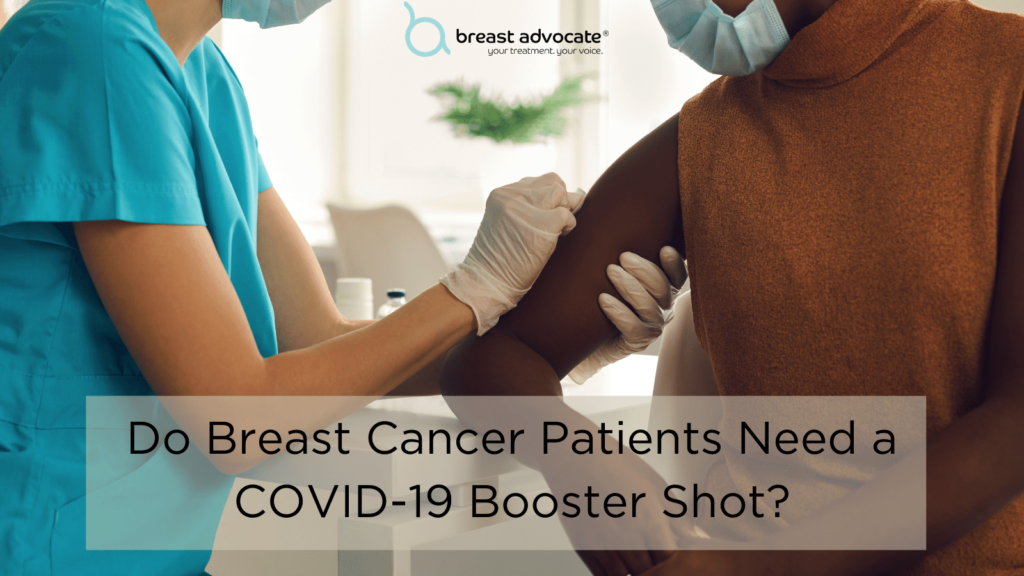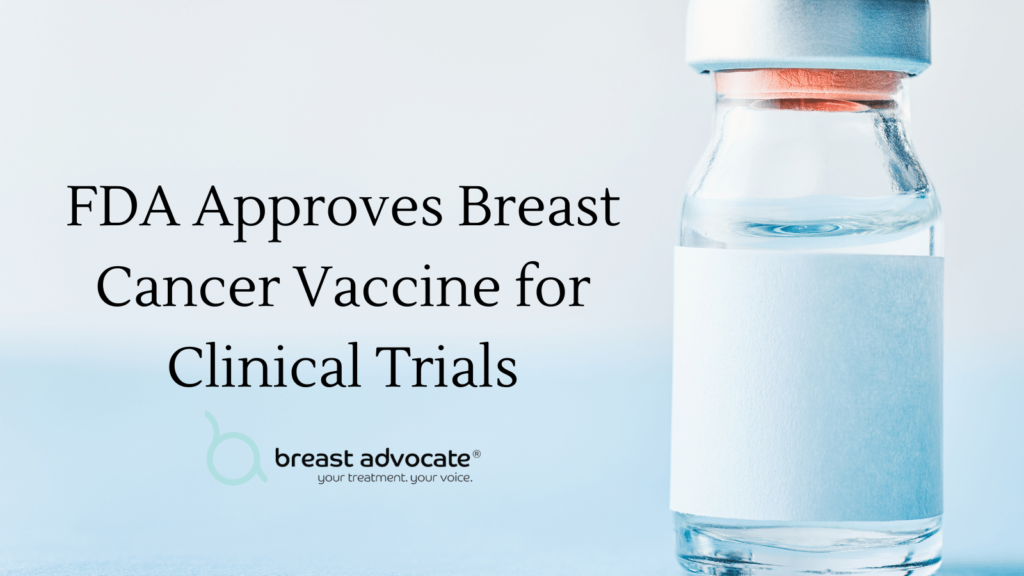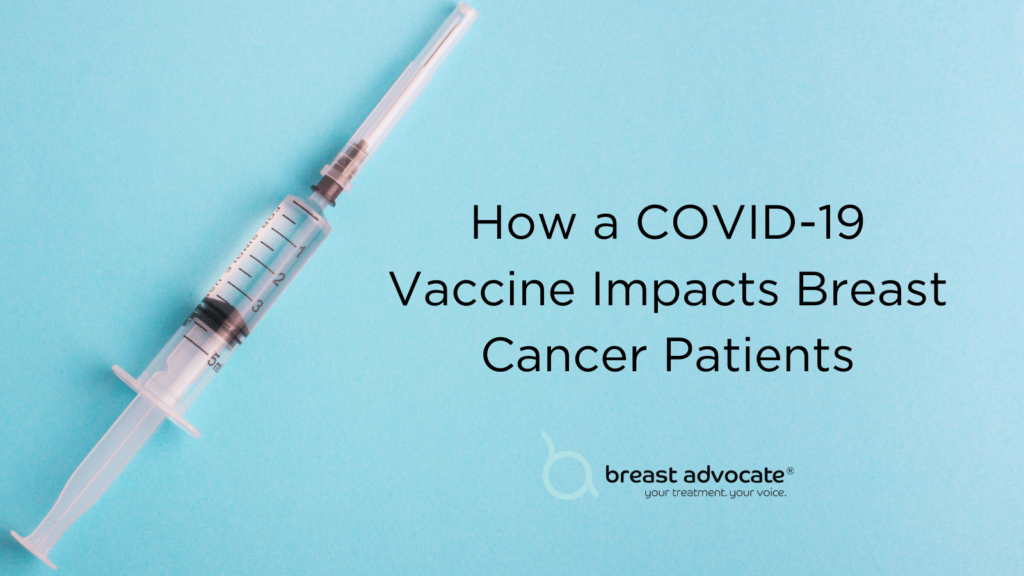Do Breast Cancer Patients Need a COVID-19 Vaccine Booster Shot?

Recently, news of the possible need of an additional COVID-19 vaccine dose has been making headlines. The “booster” shot provides additional protection against severe illness and death from a COVID-19 infection.
This news comes as the rise of the Delta variant is sweeping the nation and largely impacting the unvaccinated and immunocompromised community.
Why is a booster shot necessary?
Studies show that protection against COVID-19 from the first round of vaccine shots may begin to deteriorate after 6-8 months. Research also shows that immunocompromised individuals may have even lower protection following the first round of shots. By taking a third shot of one of the mRNA vaccines (Pfizer or Moderna), protection and immunity against the coronavirus is likely to improve. This not only decreases your chances of getting the virus, but greatly decreases your chances of serious illness or death if you do still get COVID-19.
Who is eligible for a booster?
At this time, the recommendation is that anyone who is immunocompromised should get a booster shot. This includes patients who are in active cancer treatment or have recently completed cancer treatment (chemotherapy and/or radiation). Anyone who has recently been diagnosed with breast cancer falls into this category. It is highly likely that the recommendation will be extended to include everyone at some point soon.
Are there any side-effects from a third COVID-19 vaccine shot?
Reported side effects of an additional COVID-19 shot are similar to the side effects reported for the first two doses.
What if you are unsure about getting a booster?
If you or someone you know is unsure about getting the booster shot, or wondering if they should, it is important to discuss this openly with your healthcare team. The data available from studies so far show the COVID-19 vaccines are safe and effective, but their effectiveness may wane over time and/or they may become less effective with new variants. For those individuals who received the Johnson and Jonhson shot, data is still being collected to see whether an additional shot will be recommended.
Breast Cancer Vaccine set for Clinical Trials

The new year is kicking off with hopeful news about a breast cancer vaccine. The US Food and Drug Administration (FDA) approved a new vaccine for triple-negative breast cancer to enter clinical trials. Invented and developed by Cleveland Clinic immunologist Dr. Vincent Tuohy, the vaccine has been 10 years in the making.
Triple-negative breast cancer is an aggressive form of breast cancer with limited treatment options. According to the Center for Disease Control (CDC), triple-negative breast cancer (TNBC) does not have any of the receptors that are commonly found in other types of breast cancer. This makes this type of breast cancer more difficult to target and treat with drugs. So far, chemotherapy has been the mainstay of treatment. The demographics of TNBC is also different from other breast cancer subtypes, targeting predominantly women under 40yrs of age, Black women, and women who carry the BRCA1 gene mutation.
The Cleveland clinic is partnering with Anixa Biosciences, who has an exclusive worldwide license to the new technology. Pre-clinical trials conducted on animals showed 100% of mice that were not vaccinated and got a placebo drug, developed breast cancer and died. Phase 1 of the human clinical trials will begin as soon as possible. The trials will include both women and men and will hopefully be completed within two years.
Women who intend to breast feed in the future will not be candidates. This is because the vaccine is designed to attack alpha-lactalbumin-expressing cells. By attacking these cells, there will likely be damaging effects to milk production. “Most triple-negative breast cancers express alpha-lactalbumin,” Tuohy says. “It is a mistake that the tumors make because they have no default inhibition mechanisms through progesterone and estrogen signaling that would ordinarily prevent the expression of this protein.” He describes the vaccine mechanism as “simply taking advantage of this mistake.”
Dr. Amit Kumar, President and CEO of Anixa stated, “We are pleased that the FDA authorized human clinical trials of our potentially paradigm-shifting vaccine for the prevention of breast cancer. This approval will eventually lead to recruitment of patients and initiation of the trial.”
There are several breast cancer vaccines currently in development across the globe. Although these potential advances are very exciting, unfortunately it will likely be a while before patients interested in a vaccine will have access to it.
How a COVID-19 Vaccine Will Impact Patients With Breast Cancer
This week, news broke that the drug company Pfizer has developed a vaccine for COVID-19. Pfizer and its partner company BioNTech reported that “individuals who received two injections of the vaccine three weeks apart experienced more than 90% fewer cases of symptomatic Covid-19 than those who received a placebo.” So far, Pfizer and BioNTech have reported no serious safety concerns.

The Phase 3 study is ongoing and additional data is still being collected. The effectiveness of a vaccine can only truly be determined once millions of people are vaccinated. However, experts say that the preliminary data indicates that the effectiveness should be very high. Pfizer will be seeking emergency use authorization from the FDA and anticipates having 50 million vaccine doses globally this year, and 1.3 billion next year.
The news of a vaccine is obviously fantastic. As many of us struggle to find balance in this new world, the feeling of hope that a vaccine brings is most welcomed right now. Despite this being one of the most rapidly developed vaccines in history, “COVID-19 fatigue” still makes it feel overdue.
Since this particular vaccine needs to be stored in extremely cold temperatures (-94°F), distribution headaches will need to be overcome before it can reach communities, starting with highest-risk populations. Unfortunately, it may be that many people outside urban areas and major medical centers have to wait for other vaccines to work their way through the development pipeline because of this refrigeration requirement.
As vaccines begin to roll out, patients with breast cancer will hopefully be able to be among the patients who benefit.
Routine Screenings, Diagnostic Tests and Clinic Visits
So many individuals, either with a history of breast cancer or a genetic predisposition to developing cancer, have either skipped or delayed their screening appointments due to fears of contracting the coronavirus. The full impact of these delays will likely not be known for many months to come, but doctors are urging patients to return to their normal screening schedules. Likewise, diagnostic tests and necessary in-person clinic visits (eg for infusions) should continue. Currently, hospitals, medical clinics, and doctor’s offices have protocols in place to decrease the risk of exposure and spread of this virus as much as possible. Healthcare workers are doing their best to give patients confidence in these safety measures, but a vaccine would go a long way in minimizing risk and easing fears further.
Surgery Scheduling
During the COVID outbreak, many hospitals and surgeons canceled elective (defined as “not immediately life-saving”) surgical cases to help reduce the burden on the healthcare system, to help preserve personal protective equipment (PPE) for healthcare workers, and to minimize potential exposure to the the virus. While elective procedures, including breast reconstruction, have mostly resumed, some patients remain fearful of proceeding with a procedure that may be able to wait and are therefore postponing scheduling. Additionally, infection numbers are once again increasing across the US raising the question whether another shut down of elective procedures is a possibility. A successful vaccine program would essentially ensure hospitals could return to normal pre-pandemic operative schedules while providing patients with some added peace of mind.
No Vaccine is ever 100%
Even if you receive the vaccine soon, it is important to remember that you will still not be completely protected. Until vaccination is widespread and we beat this pandemic, we strongly recommend you continue to protect yourself and follow the CDC guidelines.






